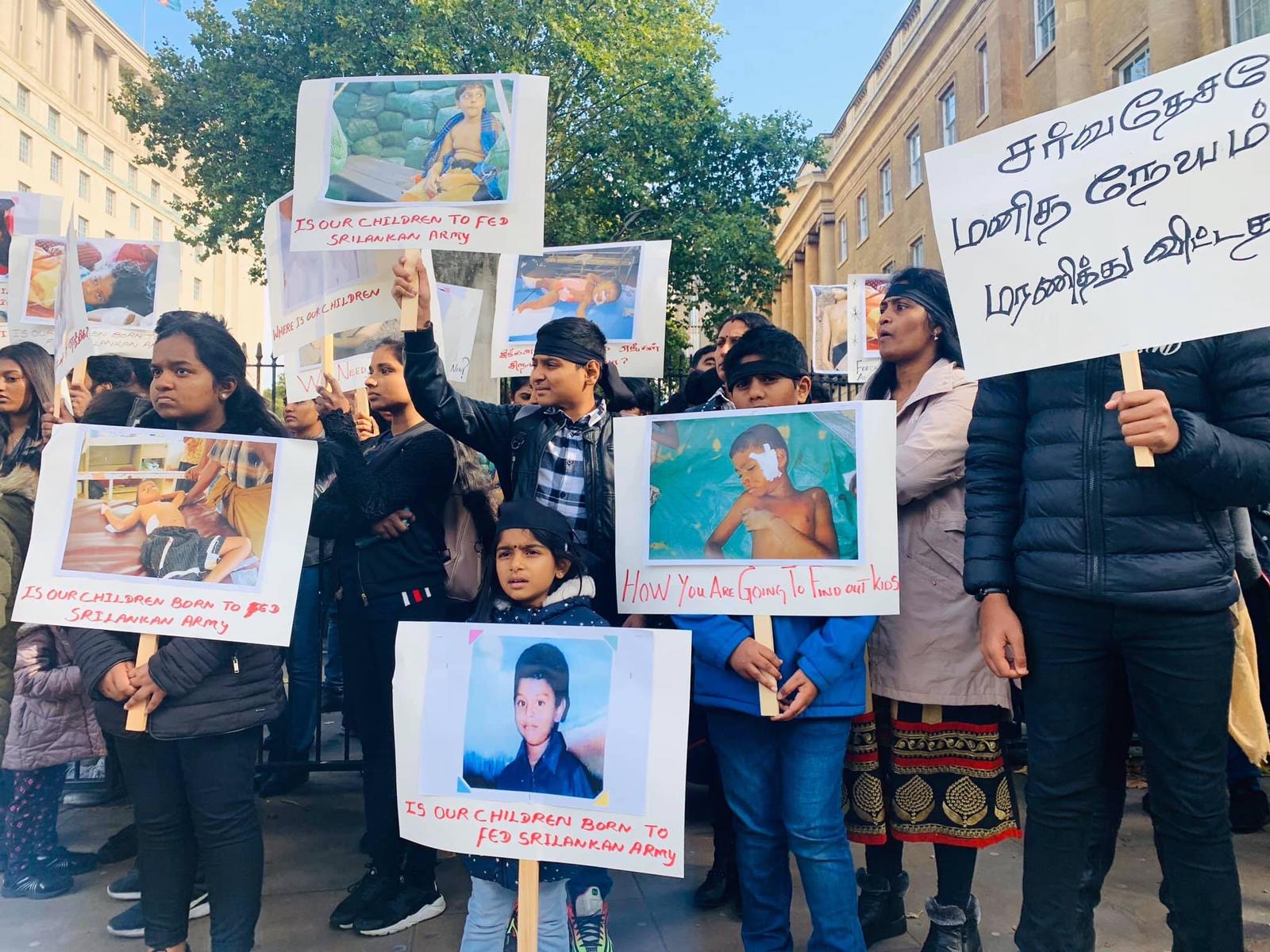British Prime Minister Boris Johnson announced he will be resigning following a turbulent week of politics in London.
Though he will be stepping down, Johnson is planning to stay on in 10 Downing Street until a new Conservative party leader is elected by the autumn.
As he reaches the end of his tenure as Prime Minister of the United Kingdom, we look back on his statements on the British Tamil community, as well his record on advancing justice for mass atrocities in Sri Lanka.
‘An enormous thank you to our wonderful Tamil community’
Johnson has enthusiastically marked Thai Pongal, the Tamil harvest festival that takes place in January, every year since taking office at Number 10 in 2019.
Earlier this year, he released a video message to mark the festival, stating it was an opportunity to “celebrate our fantastic Tamil community”. Johnson said British Tamils have “long been woven into the very fabric of British life and without [them] our country would be so much diminished”. “So at Thai Pongal and smack in the middle of Tamil Heritage Month, no less, let’s all take a moment to say a big nandri to our Tamil friends and neighbours,” he added.
In his 2021 message, he highlighted the contribution that British Tamils made towards the coronavirus pandemic response in the country.
Johnson said he wanted to “thank you for everything you’re doing in our struggle against COVID, because throughout this crisis your values of hard work, discipline and community spirit have really shone brightly”.
“From the outright bravery of those Tamil doctors who are right now on the frontline in our NHS, the businesses that have kept on going, the sacrifices you are making today by not, alas, getting together with family and friends and celebrating in the usual way.”
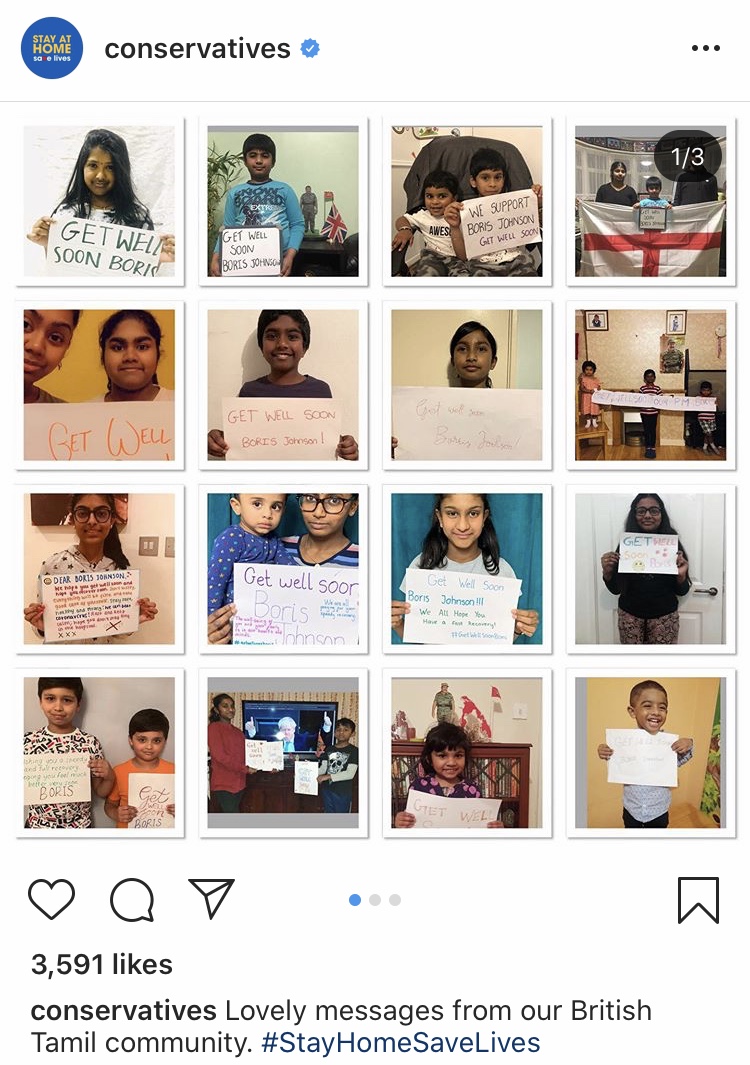
The prime minister himself was admitted into hospital with COVID-19 in April 2020, when British Tamils were amongst those who sent him wishes for a speedy recovery, with one photograph posted on the Conservative Party’s official social media pages garnering thousands of likes.
“Let me say an enormous thank you to our wonderful Tamil community,” Johnson said earlier that year. “From building businesses that boost our economy, teaching children in our schools, treating patients in our NHS, caring for the vulnerable in our society, and much, much more. Your fantastic contribution makes a real difference.”
And in 2019, on the day of the British general election, Johnson released a video thanking the British Tamil community for their contribution to life in the UK and expressed hopes for accountability in Sri Lanka.
“I want to thank the Tamil community for everything they do for our country. And I think that the values of the Tamil community and the contribution they make to the NHS, to the entrepreneurship in our country, the value they attach to education, educational achievement make a fantastic difference,” he said. “I just want to say very much that I hope there will be a reconciliation in Sri Lanka, accountability for what has gone before us, what’s happened in the past and long term peace in Sri Lanka. Nandri.”
The message sparked an angry backlash from Sri Lanka with senior Sinhala Buddhist monk Omalpe Sobitha calling for Sri Lanka to withdraw from the Commonwealth in retaliation.
“He ends the speech by thanking in Tamils," said the monk. "We are not sure if he was elected as PM of Britain or of Sri Lanka… We need to condemn this statement and withdraw from the Commonwealth.”
The monk’s statement follows similar criticism made by senior Sri Lankan politicians and the Sri Lankan High Commission in London, who were up in arms with the Conservative party manifesto. This manifesto called for the continued backing of “international initiatives” for reconciliation, stability and justice “across the world” and in “former and current conflict zones”, singling out the situations of divided states in Cyprus, Sri Lanka and the Middle East.
Rubbing shoulders with war criminals
Despite his praise for British Tamils, Johnson frequently came under criticism for his policy towards them.
Rubbing shoulders with a war criminal - Boris Johnson welcomes Rajapaksa at COP26 #COP26 #Tamil #Genocide https://t.co/MFtEFQ4iLp pic.twitter.com/xRvqz5FKwb
— Tamil Guardian (@TamilGuardian) November 1, 2021
Last year, Johnson welcomed Sri Lankan President and war criminal Gotabaya Rajapaksa at the 2021 United Nations Climate Change Conference COP26 in Glasgow, as British Tamil activists protested outside.
"It's so disappointing to see our prime minister bump elbows with a war criminal," said one Scottish Tamil activist, highlighting how former British Prime Minister David Cameron had refused to shake hands with Gotabaya Rajapaksa. "It's a good thing they're not shaking hands - Gotabaya's are stained with blood."
Britain’s foreign policy with Sri Lanka has also been lacklustre, with still no accountability for mass atrocities or genocide, more than 13 years since the end of the armed conflict.
British Tamils protesting outside Downing Street in 2019.
Writing to Johnson last year, leader of the UK Liberal Democratic party Ed Davey slammed the proposed resolution on Sri Lanka at the UN Human Rights Council which had been drafted with British input, stating it “completely fails to rise to the challenge” and called for Sri Lanka to be referred to the International Criminal Court.
UK Shadow Minister for Asia and the Pacific Stephen Kinnock also criticised the then-proposed UN resolution and questioned why the government’s review of its Global Human Rights sanctions regime did not include “a single senior Sri Lankan government minister, official or military officer”.
“It is beyond doubt that the Sri Lankan government and military will continue to deny, delay and evade accountability,” said Kinnock, who said the UK “owes it to the victims and survivors of the atrocities that have taken place in Sri Lanka to ensure that it rises to the occasion and shows the moral courage and leadership that is so urgently needed”.
However, not a single Sri Lankan government or military official has been sanctioned by the UK, nor have there been any prosecutions for mass atrocities. The drafted UN Human Rights Council resolution was passed, despite criticism from human rights groups and Tamil organisations over the weakness of the text.
To date, no perpetrators have been held accountable.
Under Johnson’s tenure however, senior British leaders have met repeatedly met with Sri Lankan officials.
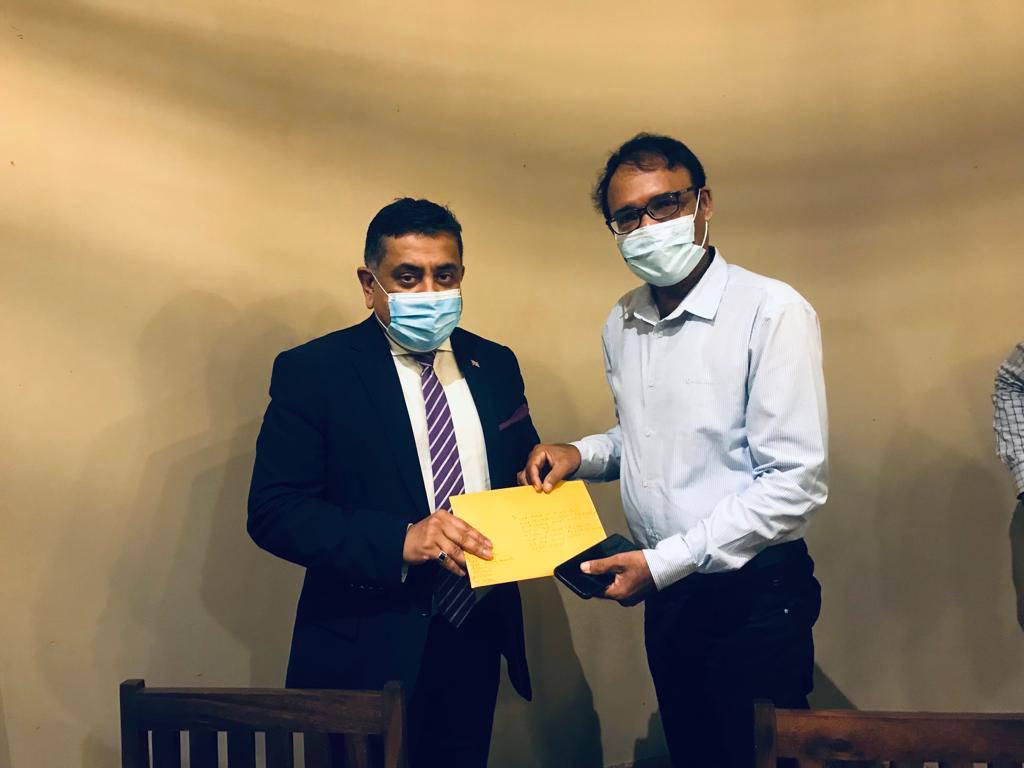
Lord Ahmad meeting with Tamil civil society leaders in the Eastern Province.
British South Asia Minister, Lord Tariq Ahmad, completed a 3-day tour of Sri Lanka landing in Colombo and making trips to Jaffna and Trincomalee where he stressed the importance of human rights and accountability.
A meeting between Britain’s Foreign Minister, Liz Truss, and her Sri Lankan counterpart GL Peiris was however, widely condemned over the failure to raise human rights issues on the island.
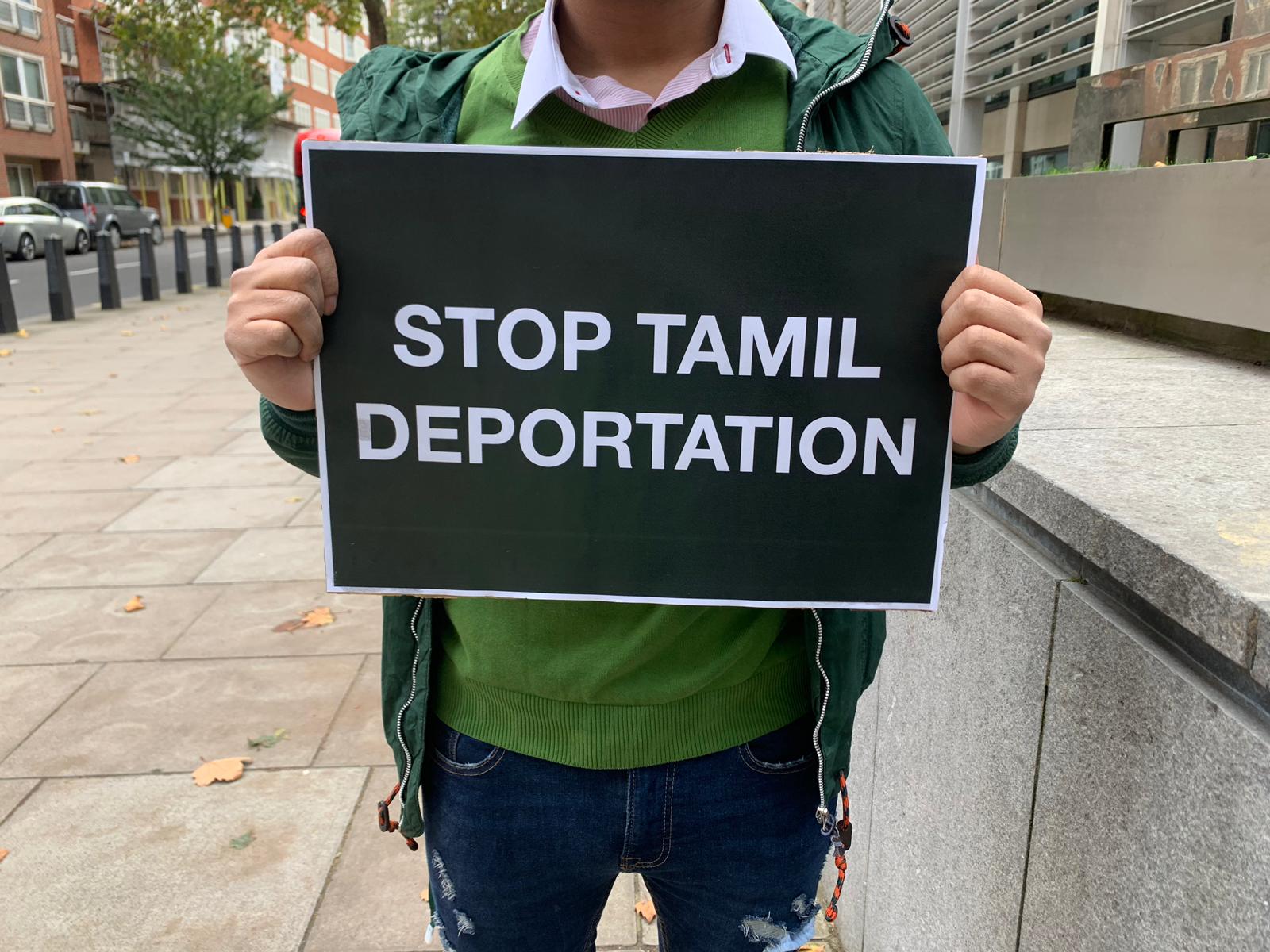
A protest outside the British Home Office in 2019.
British Home Secretary, Priti Patel, also met with Sri Lanka’s High Commissioner to the UK, Saroja Sirisena earlier this year to discuss “shared issues of security and migration”, after a series of serious failures which have put Tamil asylum seekers at risk of deportation and left one Tamil without formal immigration status for almost 40 years.
Last May, the British Upper Tribunal ruled against the Home Secretary and in favour of two Tamil asylum seekers in the case known as KK & RS vs the Home Secretary. The case centred on the asylum appeal of two Tamil refugees who were detained by Sri Lanka’s security forces and subject to torture. The Home Office rejected their claims and alleged that they were not at risk of abuse upon returning to Sri Lanka as they were not high-profile figures. The Tribunal rejected the Home Office’s claim and recognised the risk of arrest and torture Tamil activists continue to face in Sri Lanka. Responding to the ruling the Home Secretary tried to overturn the court ruling but had her appeal rejected last month.
The International Truth and Justice Project (ITJP) has documented 178 credible cases of torture from 2015-2018, excluding 22 individuals abroad who reported torture following the UN special investigation. A further report detailed the testimonies of 15 Tamils who were abducted and tortured since Gotabaya Rajapaksa assumed the office of the President in 2019.
Read more here: How a landmark British ruling may save Tamil activists from deportation to Sri Lanka
Following the Tribunal ruling the Home Office has since amended its guidance to reflect the threat of torture in Sri Lanka.
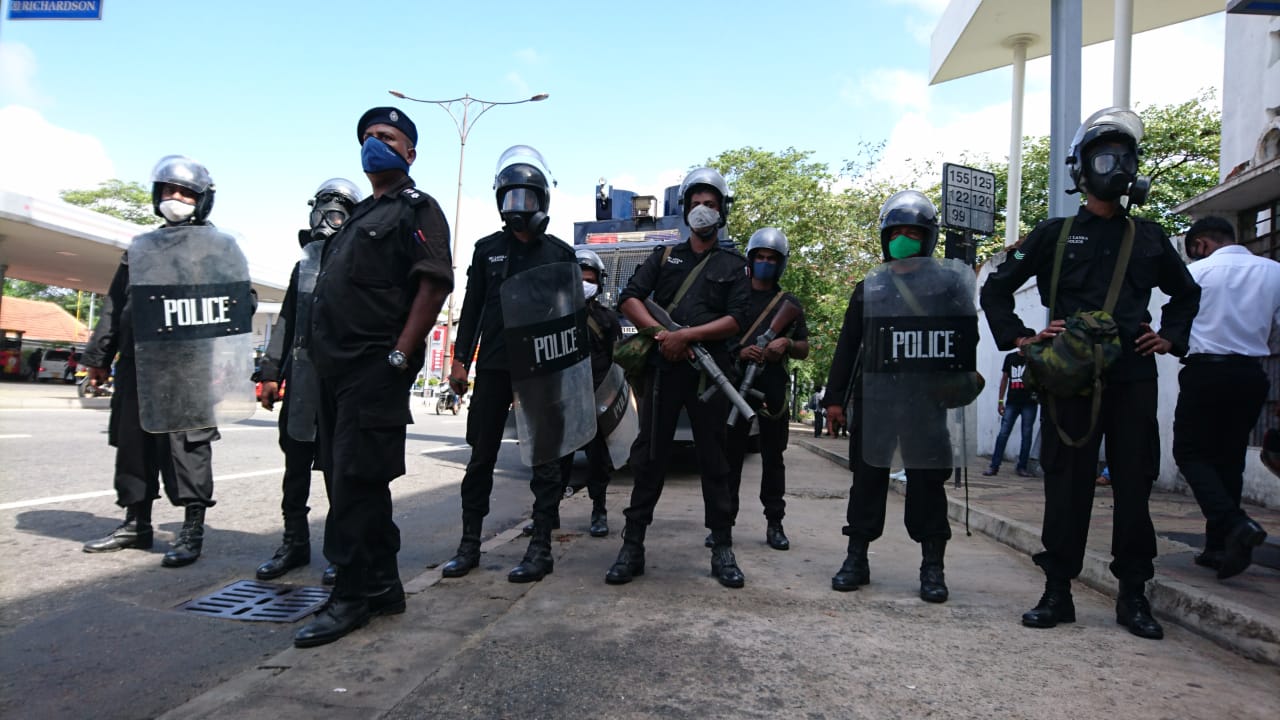
Sri Lankan police in Colombo, 2020.
Under Johnson, Britain also helped train and fund the Sri Lankan police.
Last year, Police Scotland informed the UK High Commission in Sri Lanka that they will not extend their training contract with Sri Lanka’s police force in March 2022, when it is set to expire, due to ongoing human rights concerns.
The move came after years of campaigning for Police Scotland to terminate its programme with Sri Lanka which has been seen as a smokescreen for human rights abuses.
The UK Foreign Office said however that it may continue to train Sri Lankan police, despite the ongoing human rights concerns.
Time as Foreign Secretary
Prior to his appointment as Prime Minister, Johnson previously held the post of Foreign Secretary.
Though he once reportedly said “the legacy of human rights abuses in Sri Lanka” would be one of the main topics of discussion at the 2018 Commonwealth Heads of Government Meeting in London, he also faced criticism over his government’s lack of action on progress towards accountability at the time.
“It is shameful that the UK is no longer leading the way in the fight for justice and we call upon Boris Johnson to speak at the UN human rights council in Geneva to strengthen the powers of the UN to intervene in this tragedy,” said Labour MP for Bassetlaw John Mann in 2018.
More praise for Tamils as Mayor of London
Johnson also previously held the post of Mayor of London, where he repeatedly praised British Tamils for their contribution to life in the UK.
In a statement issued in 2012, Johnson said that in light of the 'Sri Lanka’s Killing Fields' documentary, he “would like to offer my continued support and condolences to all those affected by the conflict, including British Tamils”.
“We stand by our fellow Londoners as they continue to mourn the loved ones they tragically lost during the last days of fighting in northern Sri Lanka,” he added.
Later that year the Official Website of the Government of Sri Lanka slammed Johnson, claiming that he and his then counterpart candidate for Mayor of London Ken Livingstone “made strong rival pitches for the support of the pro-LTTE organizations".
He has also issued statements praising the community on occasions such as Thai Pongal and Tamil New Year.

